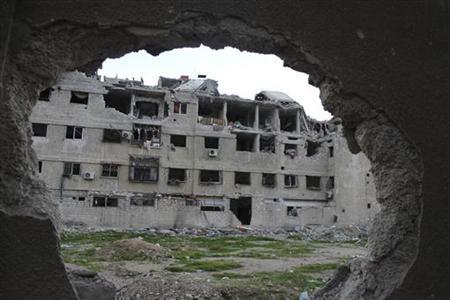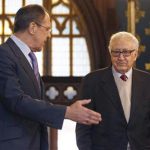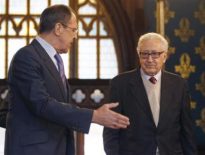(Reuters) – Attempts by the United Nations to end the bloody 21-month-old Syrian conflict through diplomacy have been a resounding failure and there is little reason to expect a quick change given the Russian-U.S. rift on Syria.

After a year of intensive diplomatic efforts by the world body, U.N.-Arab League peace mediator Lakhdar Brahimi of Algeria has made no more progress than his predecessor, former U.N. Secretary-General Kofi Annan, in getting the government and rebels to come to the negotiating table, or getting Russia and the United States to overcome their deep disagreements on Syria.
Brahimi heads to Moscow on Saturday to meet with Russian Foreign Minister Sergei Lavrov, the United Nations said, but expectations are low. Syria’s opposition leader rejected an invitation from Russia to attend peace talks, which was a blow to Brahimi’s efforts.
At the heart of the diplomatic roadblock is a seemingly unbreakable impasse on the U.N. Security Council, where Russia and the United States, both veto-wielding permanent members of the 15-nation group, are seeing their bilateral ties deteriorate.
There is no reason to expect anything different in early 2013. After three joint Russian-Chinese vetoes on Syria, the Security Council has all but given up on the issue.
“It’s very depressing to be a party to failed diplomacy,” a senior U.N. official told Reuters. “There’s no end to the (Security Council) deadlock and as long as that deadlock remains, it’s hard to make a difference beyond humanitarian aid, and that’s not easy.”
In addition to generally rocky relations between Washington and Moscow, Russia has strategic reasons for standing by Assad. He has been a staunch ally, a major purchaser of Russian arms and host to Russia’s only warm-water naval port. But even Russia realizes Assad will likely be ousted sooner or later.
NO CEASEFIRE
Annan, the first U.N.-Arab League peace negotiator to try to end the escalating civil war, focused on getting Syrian President Bashar al-Assad’s government and the opposition to agree to a ceasefire.
With neither side willing to lay down its weapons, a frustrated Annan announced his resignation in August, saying the divided Security Council had undermined his efforts. He urged Russia, China and Iran to do more to push for an end to the bloodshed.
Brahimi is concentrating on healing the rift between Russia and the United States as the conflict in Syria becomes increasingly gruesome and sectarian, U.N. officials and diplomats say.
Disagreements between the United States and Russia or China on the 15-nation Security Council are nothing new. They have had sharp differences on crises in Georgia, North Korea, Myanmar, Zimbabwe and elsewhere that have prevented the council from taking any meaningful action.
But the deadlock on Syria is especially frustrating for U.N. officials and diplomats, who complain the United Nations has been confined to the sidelines as the corpses pile higher.
U.N. Secretary-General Ban Ki-moon has repeatedly urged countries to unite in support of Brahimi’s efforts but that has not happened.
“We do not see any prospect of any end of violence or any prospect of political dialogue to start,” Ban told reporters last week.
Brahimi is convinced that ending the U.S.-Russian rift is the key to unraveling the Gordian knot that has prevented a negotiated end to a war in which 44,000 people have died.
The crux of their disagreement is whether Assad should go now, as the rebels, Washington and the Europeans want, or later, as Moscow would prefer, after a period with a transitional leadership that could include members of Assad’s government.
Russia has repeatedly said it is not wedded to Assad, although it has refused to abandon him.
“For (Russian President Vladimir) Putin, it’s all about not compromising with America at the moment,” a senior Western diplomat said.
WASHINGTON-MOSCOW TIES
The latest example of worsening U.S.-Russian ties is Moscow’s new ban on U.S. adoptions of Russian children, a move that came in retaliation against U.S. human rights legislation aimed at Russia.
Diplomats and analysts say it is not Brahimi’s fault that he has failed. The veteran Algerian diplomat played down hopes that he could succeed from the outset.
Richard Gowan of New York University said Brahimi’s modest approach has restored some of the U.N. credibility that was lost while Annan was the Syria mediator.
“But (Brahimi’s) current peace plan is at least half a year out of date,” Gowan said. “The rebels simply will not buy it.”
Brahimi is pushing for a transitional government and has suggested he wants to build on an international agreement signed in Geneva six months ago that envisioned a provisional body – which might include members of Assad’s government as well as the opposition – leading the country to a new election.
His recycled peace plan has not made him popular with the rebels, who also have complained that the United States and Europeans have failed to provide them weapons, despite the West’s clear desire to see Assad ousted. Diplomats say arms are reaching the rebels from Qatar, Saudi Arabia and Turkey.
The mainly Sunni Muslim Syrian rebels have seized the military initiative since June’s Geneva meeting and the political opposition has ruled out any transitional government in which Assad, who is from Syria’s Alawite minority, has a role.
Radwan Ziadeh of the opposition Syrian National Council dismissed Brahimi’s proposal as “unrealistic and fanciful” and said a transitional government could not be built on the same “security and intelligence structure as the existing regime.”
Some diplomats say Russia’s influence on Syria is wildly exaggerated and that Assad is not going to compromise because he is fighting for his own and the Alawites’ survival.
So where does that leave Russia?
“It’s understood that Bashar al-Assad’s regime will not last long,” said Georgy Mirsky, a Middle East expert at the Institute for World Economy and International Relations in Moscow.
“But this does not mean that Russia is ready to join the West, the Turks and the Arabs and demand that Assad go? That would be senseless. Syria is lost (to Russia) anyway,” he said.
At least Russia “will be able to say that we do not abandon our friends,” Mirsky said.
(Additional reporting by Steve Gutterman in Moscow and Dominic Evans in Beirut; Editing by Bill Trott)





